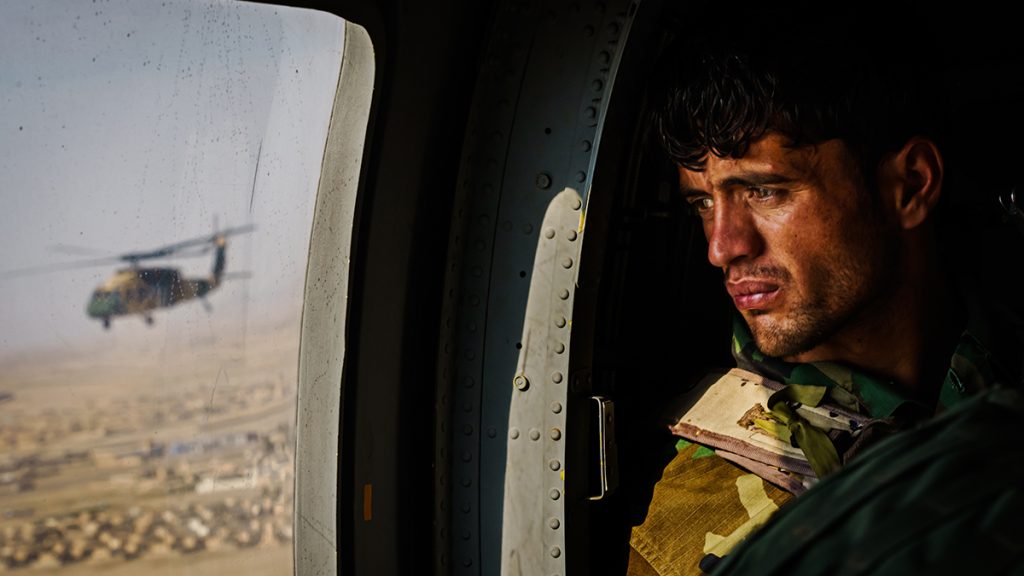
This 2021 photo by photojournalist Marcus Yam was part of Yam’s Pulitzer Prize-winning coverage of the U.S. withdrawal from Afghanistan. It shows a soldier surveying the terrain out of the window of a UH-60 Black Hawk during a resupply flight toward an outpost in the Shah Wali Kot district north of Kandahar, Afghanistan, on May 6. Since the U.S. withdrawal, the Taliban have overpowered government troops, further denying Afghan security forces the use of roads. All logistical support to thousands of outposts and checkpoints — including re-supplies of ammunition and food, medical evacuations, or personnel rotation — must be done by air. Yam is the symposium’s keynote speaker. | Photo: Marcus Yam
Symposium to bring experts in journalism, law and the military together at Reynolds Journalism Institute this April
The Missouri School of Journalism’s Reynolds Journalism Institute (RJI) and the MU School of Law Veterans Clinic are teaming up to host the 2024 Veterans Clinic Symposium, which will take place on Friday, April 19 at RJI’s Smith Forum. Registration for the symposium is free, and those unable to attend in person will be able to view a livestream.
The full schedule for the symposium can be found here.
“Searching for Truth: When Media and Military Come Together” will bring journalists and war documentarians together with experts in media law and the military. Discussions will center around the challenges that appear when these fields converge, as in situations like coverage of the Israel-Hamas War and whistleblower cases.
“This partnership with the School of Law allows us to present in-depth perspectives on a complex, timely subject that has far-reaching impacts,” said Randy Picht, executive director of RJI. “Attendees can expect to come away with practical knowledge about how military and journalistic issues can intertwine and what to do in those situations.”
This partnership with the School of Law allows us to present in-depth perspectives on a complex, timely subject that has far-reaching impacts. Attendees can expect to come away with practical knowledge about how military and journalistic issues can intertwine and what to do in those situations.
Randy Picht, executive director of RJI
Marcus Yam, a photojournalist with the Los Angeles Times, will deliver the symposium’s keynote address. During the past decade, Yam has been recognized many times by RJI’s Pictures of the Year program, including being named Photographer of the Year. He has covered unrest and conflict in places like Ukraine, Lebanon and Hong Kong. In 2022, Yam won the Pulitzer Prize for his coverage of the fall of Afghanistan. He has spent much of this past year covering the Israel-Hamas War.
Additionally, a series of panels will address how to maintain ethical standards in morally gray environments, how to approach whistleblower stories and the laws and challenges around proving a war crimes case.
Panelists will include Kelly Kennedy — the first female president of Military Reporters and Editors and the only American woman to have both served in combat and covered it as a civilian journalist — and Aric Toler, a reporter for the New York Times whose work has exposed Russian espionage, war crimes and gaps in the U.S. intelligence community’s information security.
“We are excited to explore, in collaboration with the School of Journalism, the important ways journalists and military personnel and veterans intersect,” said Brent Filbert, director of the Veterans Clinic. “Attendees will get to hear how war often impacts servicemembers and correspondents in similar and devastating ways. The symposium will also provide fascinating presentations on the role of journalists in addressing the most important matters in today’s military and international environment.”
This is the second year in a row that RJI has partnered with the School of Law for a topical symposium — last year’s version focused on artificial intelligence, defamation and the changing legal landscape of social media.
About the MU Veterans Clinic
Students in the University of Missouri School of Law Veterans Clinic help veterans and their families secure disability-related benefits. Student work is primarily focused on veterans’ benefits cases, as well as discharge upgrades.
Since its inception in 2014, the clinic has provided guidance to over 1300 veterans and family members. The clinic is run like a law firm, providing Mizzou Law students with an experience designed to prepare them for the practice of law while securing retroactive monetary benefits for our nation’s veterans. To date, the clinic has recovered in excess of 12.5 million dollars for its clients.

Comments